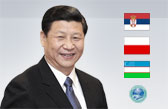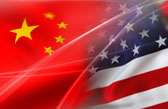National Committee marks 50th with satisfaction
By CHEN WEIHUA in Washington (chinadaily.com.cn) Updated: 2016-06-28 10:22Three former US national security advisors took some time Monday to reflect on US-China relations, widely considered the most consequential bilateral relations in the 21st century.
Richard Allen, national security advisor from 1981 to 1982 under President Ronald Reagan, said negotiations played an important role in the relationship.
He said the US at the time was able to conduct normal relations with China. Conceding that China sometimes was displeased, Allen said that "on the whole, it was smooth".
Stephen Hadley, national security advisor from 2005 to 2009 under George W. Bush, recalled the rough start of the bilateral relations during that administration, such as the EP-3 spy plane collision with a Chinese military fighter jet off China's Hainan Island in the South China Sea on April 1, 2001.
But the two governments managed it effectively, leading to a highlight such as President Bush and his family attending the opening ceremony of the Beijing Olympics in 2008.
Hadley was displeased that the Trans-Pacific Partnership (TPP) has been sold as countervailing China, citing President Barack Obama's comment that "China should not write the rules." Rather, he believes TPP should be used to engage countries such as China and India.
Robert McFarlane, national security advisor from 1983 to 1985 under Reagan, believes that President Xi Jinping is not seeking confrontation with the US. He said the US and China will find a way out of the South China Sea issue.
"I have great confidence in the future of US-China relations," he told the audience at the seminar held by the National Committee on US-China Relations (NCUSCR) to mark its 50th anniversary.
The gathering at the Omni Shoreham Hotel along the Rock Creek included many top China hands in the US, such as Richard Solomon, a former assistant secretary of state for East Asia and Pacific Affairs; Stapleton Roy, the former US ambassador to China who was born in China, and Chi Wang, one of the co-founders of the NCUSCR in 1966.
The NCUSCR was one of the first and leading organizations in the US to promote understanding and cooperation between the two countries.
Monday's talk was part of its Leaders Speak series to mark the anniversary. In the previous months, the series included panels of defense secretaries, women commerce secretaries and trade representatives such as NCUSCR Chair Carla Hills, a former US trade representative.
Stephen Orlins, president of NCUSCR, revealed that upcoming talks in the series will include panels of former Treasury secretaries and former secretaries of state such as Henry Kissinger.
The NCUSCR has partnered with the Chinese side to hold Track II dialogues on important issues facing the two countries, such as on energy, maritime issue and international law. The latest one on maritime issue will be held Tuesday in Washington.
"Even on the most difficult issues, we are a trusted honest broker," Orlins said of NCUSCR, which he has served as president since 2005.
While the audience included many who have worked in the NCUSCR at various times in the past half century, Jan Berris, NCUSCR vice-president, is by far the longest-serving staff member, having worked at the organization for 45 years.
"That is a long time, but it's mainly because I am a people person. And I just think it's extraordinarily lovely to work in an organization where I was surrounded by wonderful people, both Chinese and Americans," said Berris, who has been involved in the hundreds of Chinese and American delegations visiting each other's countries, including the 1972 visit to the US by a Chinese ping-pong team.
Besides serious talks by the three former advisors, the Monday celebration also included a ping-pong exercise, photo booth and cordial chats among the people who have devoted their lives to improving the bilateral relationship.







